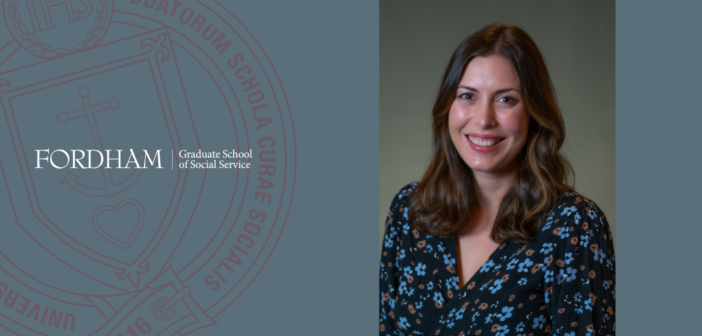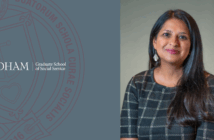Graduate School of Social Service Assistant Professor Jenn Lilly, Ph.D., has been selected to receive a prestigious two-year award from the National Institute of Mental Health (NIMH) for her research focused on reducing mental health disparities among Latina youth.
The award is part of the NIMH’s Health Disparities Research (L60) Program, which provides educational loan debt repayment funding for qualified health professionals involved in minority health and health disparities research.
“It feels really validating to have that show of support from a federal funding institution that recognizes rigorous, innovative research,” Lilly said. “I’m really grateful to be recognized in that way.”
How the Research Began
The work Lilly will conduct over the next two years with the help of this grant is a continuation of the research she has spearheaded since 2024.
It began with her research article, “‘I Learned to Bottle Up My Feelings From a Young Age’: A Narrative Analysis of Latina Young People’s Family Mental Health Socialization,” published in 2024 in Families in Society: The Journal of Contemporary Social Services.
With the help of five young Latina women—all of whom were either current students or alumni of Fordham University with interdisciplinary interests—Lilly transformed her research into a narrative film titled Nuestro Apoyo (“our support”). The team collaborated on the storyline, character development, and dialogue, resulting in a completed film script that was later brought to life by Brooklyn-based The Studio at ReelWorks in September 2024.
The original article has since been awarded the 2024 Best Early Career Scholar Article by Families in Society. Additionally, Nuestro Apoyo has been celebrated at film festivals across the country, including the MiraLA Film Festival (where it won Best Mental Health Short), the LA Latinx Film Festival, and the Philadelphia Latino Arts and Film Festival.
“We really want to create a film that [the audience is]going to strongly identify with to help them start critically reflecting on what mental health communication looks like in their families, what mistakes they might have made in the past that they could learn from, and how to do things differently in the future,” Lilly said before the film’s release.
The Next Phase: Work by and for the Community
This new phase of Lilly’s research will involve more digital innovation—this time in the form of a mobile app.
The app will be part of what Lilly is calling the Showing Our Support Program. The program will give Latine parents access to a self-paced mobile app, which will use entertainment-education strategies to empower Latine parents to promote their daughters’ mental health and prevent suicide. Nuestro Apoyo is a central component of the program’s content.
Lilly’s goal is to collaboratively develop, user-test, and pilot the app during the two-year award period. And much like the film’s construction, Lilly will involve the Latine community in the process.
“We really want to do it in a participatory, collaborative, and culturally sensitive way,” Lilly said. “The next step is to involve Latine parents, young adults who have lived experiences of either depression or suicidal thoughts and behaviors, and mental health care providers who work with Latine families to make sure that the app is tailored to their needs and preferences, and is envisioned by them.”
The app will allow Lilly and her team to measure the program’s outcomes with real-time data about user behavior and feasibility. This process will round out the project’s second phase, with the third phase, Lilly said, hopefully involving a larger clinical trial.
An Environment Conducive to Success
This isn’t the first time Lilly has applied to the NIH Loan Repayment Program. When she first did so a few years back, she wasn’t selected. She attributed the outcome change to her growth as a researcher.
“Writing the application forces you to envision what you want your research trajectory to look like over a longer period of time,” she said. “Where do I want this career to go? What is the end goal that I’m working toward, or the interrelated end goals? I learned a lot of lessons through that process, and was really hopeful going into it this time around.”
Lilly credited mentorship as a major contributor to this growth. In addition to external mentors, fellow GSS faculty members like Fuhua Zhai, Ph.D., and Kimberly Hudson, Ph.D.—the latter of whom has also received an NIH Loan Repayment Program award—lent integral advice and insight into the application process.
“I don’t think I would have gotten this award without that team behind me,” she said.
Moreover, Lilly said that Fordham’s Jesuit tradition of cura personalis (care for the whole person) and focus on human rights compose a supportive backdrop for this type of research.
“Social work as a home within itself certainly encourages and promotes this kind of work,” Lilly said, “but doing it within a university, especially in today’s political context, that has a mission firmly rooted in social justice makes it that much more aligned, and it feels truly like there is the institutional value placed on this kind of work.”



